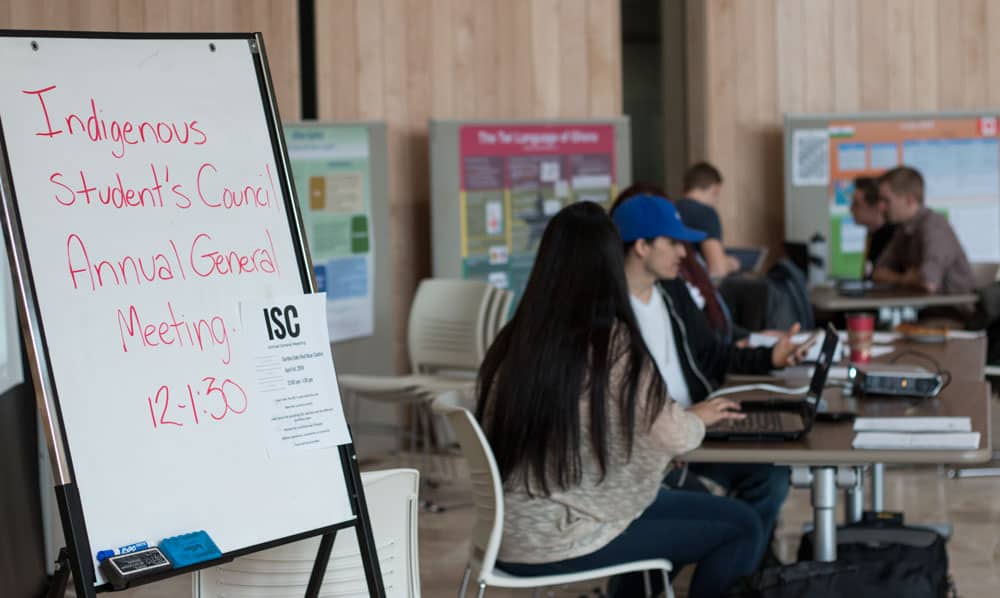Classes may be winding down for students at the University of Saskatchewan, but the Indigenous Students’ Council is already looking ahead to next year with the election  of their new executive team.
of their new executive team.
The election process officially began with the announcement of nearly 20 prospective candidates on Apr. 4. Campaign speeches were delivered the next day at the Gordon Oakes Red Bear Student Centre. While voter polls were initially set to open on Apr. 4, due to unforeseen technical difficulties, voting has been postponed to begin at 4 p.m. on Apr. 11.
For current ISC president Feather Pewapisconias-McKee, fourth-year student in the Saskatchewan Urban Native Teacher Education Program, the upcoming election reinforces the need for Indigenous representation at the U of S.
“To increase success and retention rates of our Indigenous population at the university, we need to have that representation to ensure students’ voices are heard and that Indigenous students feel they belong at the U ofS. It’s also important in creating a good atmosphere in which students feel they have that support when needed and it builds leadership within our own community,” Pewapisconias-McKee said.
As of the fall 2015 term, nearly 2,000 undergraduates self-declared as Aboriginal students at the U of S. The ISC aims to appropriately represent this portion of the student body with the positions of president, four vice-presidents, representatives from various colleges across campus, as well as a first-year undergraduate student representative.
When it comes to prospective candidates, Pewapisconias-McKee spoke to the qualities that the ISC looks for in its leaders.
“We look for passion for Indigenous issues and rights of students [and] awareness of Indigenous issues happening on campus and in the community. We also look at individuals that are driven, open and also committed,” Pewapisconias-McKee said. “Being on the ISC definitely takes time commitment and motivation when pushing for issues and talking to admin on behalf of our Indigenous students.”
The ISC has had a busy year, taking on a number of initiatives ranging from educational reform to student wellness.
“The ISC worked hard on mandating Indigenous studies and content at the U of S. Over the last two years that I’ve been a part of the ISC, we have been doing research and having discussions with departments, deans and admin about the importance of Indigenous studies — we called it ‘Decolonize Education,’” Pewapisconias-McKee said.
With the help of Gabe Senecal, former U of S Students’ Union vice-president academic, the motion to include Indigenous content was presented to the University Students’ Council in the fall of 2015 and was eventually passed on Jan. 21, 2016.
Other endeavours include study sessions, steak nights, pub crawls and providing transportation for students to off-campus events.
Although a great deal of progress has been made in terms of Indigenous representation at the U of S, Pewapisconias-McKee believes that there is still more that can be done.
“The U of S could mandate Indigenous Studies because [in] every career you go into in Canada you will be exposed to Indigenous people or land in some way or another. It’s important that students respect and understand the background of Indigenous people in order to debunk the myths and stereotypes of Indigenous people,” Pewapisconias-McKee said.
She also suggests that the U of S could do a better job of consulting and communicating with the ISC on a variety of issues.
Regardless of what students are involved in, Pewapisconias-McKee stresses the benefit of taking part in student politics at the U of S.
“I think it’s an important stepping-stone towards leadership and leadership in your community. It helps build your passion and gives you experience in what your passion may be. It also builds relationships and opportunity for people.”